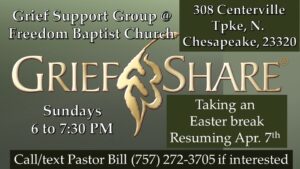The doctrinal belief of this church shall conform to that of the whole Bible, from Genesis to Revelation: the statement of faith given below shall be accepted as a true exposition of these important points of Bible teaching.
Section 1. Concerning the Verbal, Plenary Inspiration of the Holy Scriptures
We believe that the Scriptures of the Old and New Testaments, totaling sixty-six books, are verbally and fully inspired by God,1 that they are inerrant in the original writings,2 and that they are of supreme and final authority in faith and life.3
Some places where taught: 1II Tim. 3:15-17; II Pet. 1:19-21; 2Prov. 30:5, 6; Is. 40:8; 3John17:17; Acts17:11; I Cor. 10:6-12; Eph. 6:17; II Tim. 3:15-17; I John 4:1.
Section 2. Concerning the Trinity
We believe in One God,1 absolute, eternal, omnipresent,2 manifesting Himself in three co-equal Persons — Father, Son, and Holy Spirit3 — one in nature, attributes, power, and glory,4 with each His own distinct work to perform.5 He is the Creator and Upholder of the universe.6
Some Places Where Taught: 1Deut. 6:4, 5; Jer. 10:10; 2Hab. 1:12; Prov. 30:4; John 1:1-14; Heb. 1:11; 3Matt. 3:17; 18:19; II Cor. 13:14; John 1:18; Acts 5:3, 4; 4John 10:30; 17:5; I Cor. 8:6; Phil. 2:5, 6; 5John 14:26; 15:26; Eph. 1:3-4, 6-7, 13-14; 6Gen. 1:1-27; Heb. 1:10; Col. 1:15-17
Section 3. Concerning the Deity of Christ
We believe that the Lord Jesus Christ is the eternal Son of God1 and was begotten by the Holy Spirit, born of the Virgin Mary,2 and that he is true God and true man.3
Some Places Where Taught: 1 Heb. 1:1-12; Ps. 2; Col. 1:13-20; 2 Isaiah 7:14; Matt. 1:18-25; Lk. 1:26-35; 3 John 10:30; Phil. 2:6-11; Lk. 19:10
Section 4. Concerning Total Depravity
We believe that man was created in the image of God;1 that he sinned and thereby incurred not only physical death, but also spiritual death which is separation from God;2 and that all human beings are born with a sinful nature3 and are under the condemnation which God’s righteousness requires.4
Some Places Where Taught: 1Gen. 1:26-27; 2Gen. 2:7-9, 16-17; 3:1-19; I Cor. 2:14; 3Ps. 51:5; Jer. 17:9; Isa. 64:6; Rom. 7:15-24; Eph. 2:1-2; II Cor. 4:3-4; 4Rom. 3:19-21, 5:12, 8:5-9; Gal. 5:19-21; John 3:3-6, 18, 36; Rom. 1:18-21; II Thess. 1:8-9; James 2:10
Section 5. Concerning Substitutionary Atonement: Justification by Faith
We believe that the Lord Jesus Christ died for our sins, and not for our sins only but also for the sins of the whole world,1 according to the Scriptures2 as a representative and substitutionary sacrifice,3 and that He rose again for our justification;4 and that all who trustingly believe in Him are justified from all things on the ground of His shed blood and are saved by grace through faith wholly apart from human merit and works.5
Some Places Where Taught: 1I John 2:2; 2I Cor. 15:3; Acts 13:38-39; Gen. 3:15; Lev. 17:11; Heb. 9:22;28 3Isa. 53:6; I Pet. 2:24-25; I Pet. 3:18; Heb. 9:28; Rom 5:6-9; II Cor. 5:21; Gal. 3:13; I Tim. 2:5-6; 4Rom. 4:25; 5Rom. 3:19-28, 10:1-13; Eph. 2:8-10; Titus 3:3-8; I Pet. 1:18-19
Section 6. Concerning The New Birth
We believe that all who receive the Lord Jesus Christ, and Him alone,1 in repentance and trusting faith2 are born again by the Spirit through the Word of God,3 and thereby become the children of God.4 Regeneration is not the reformation of the Adamic nature, but rather the creation of a new nature,5 the quickening of the spirit,6 by the Holy Spirit.7
Some Places Where Taught: 1Acts 4:12; 2Luke 13:2-3, 24:44-48; John 3:13-16; Acts 3:19, 17:30; I Jn. 5:1; 3I Cor. 15:1-5; I Pet. 1:22-25; 4John 1:12-13; Rom. 8:14-17; Gal. 3:26, 4:4-7; 5II Cor. 5:17; Gal. 6:15; 6Eph. 2:1-9; 7Rom. 8:9
Section 7. Concerning The Two Natures
We believe that those who are born again possess two natures1 and that, through the power of the Holy Spirit,2 the new nature may be victorious over the old nature,3 but that eradication of the old nature is unscriptural.
Some Places Where Taught: 1Gal. 5:16-17; Eph. 4:22-24; 2John 15:5; Gal. 5:16-26; 3Rom.6:11-14, 8:2-5, 12-13; I Pet.1:14-16; I John 3:5-9
Section 8. Concerning Eternal Security Of The Saved
We believe that a true exposition of the righteousness of God revealed1 requires the true doctrine of the eternal security of the Truly regenerate believer.2 We reject the teaching that a public profession of faith in Jesus Christ is license to sin with the mistaken notion that Scriptures guarantee eternal security upon simply profession, or that the believer has no further responsibility to the Holy will of God.3
Some Places Where Taught: 1Rom. 1:17; 2Eph. 2:8-9; Ps. 37:28; John 5:24, 10:27-30; Rom. 3:20-26, 4:1-8, 8:1; Eph. 1:3-14; Titus 2:11-15; 3:5-8; 3Eph. 4:30; Titus 2:11-12
Section 9. Concerning The Holy Spirit
We believe that the Holy Spirit is an eternal and divine Person, co-equal with God the Father and God the Son,1 the Administrator of the Godhead,2 regenerating the lost,3 sealing the believer until the day of redemption,4 convicting of sin,5 revealing Christ,6 teaching truth,7 restraining evil,8 completing the Church (Called-out ones placed into the living body of Christ)9 energizing believers in prayer, worship, and service,10 and is ever present in the believer as a sanctifying comforter and helper.11
Some Places Where Taught: 1II Cor. 13:14; 2Zech 4:6; John 4:24, 3:34, 7:39, 16:7; Rom 8:9-10; 3John 3:5; 4Eph 1:13, 4:30; 5John 16:8-11; Eph. 4:30; 6John 15:26; 7John 14:26; Eph. 1:17; 8II Thes. 2:7; 9I Cor. 12:13; 10Rom. 8:14; Eph. 2:22; 11John14:16-17; I Cor.6:19; II Cor. 13:8; Gal.5:15-17; Eph.5:18
Section 10. Concerning The Resurrection and Present Ministry of Christ
We believe in the physical, bodily resurrection of our Lord Jesus Christ after His crucifixion,1 His ascension into Heaven,2 and His present ministry in Heaven as our High Priest, Advocate, and Intercessor.3
Some Places Where Taught: 1Matt 28:1-10; John 2:19-21; Mark 16:1-14; Luke 24:1-26; John 20:1-29; Acts 2:31; I Cor. 15:3-25; I Pet. 1:3-4; 2Acts 1:9-11; 3Eph. 1:20-22; Col. 3:1-3; Heb. 1:3, 7:25-27, 9:11-12; I John 2:1-2
Section 11. Concerning The Second Coming of Christ
We believe in the imminent,1 personal, bodily, visible, premillennial return of Jesus Christ to rapture His people2 and to establish His Kingdom on earth,3 reigning as the Only Potentate, the King of Kings, and Lord of Lords.4
Some Places Where Taught: 1Phil. 4:5; Heb. 10:37; Jas. 5:8; Rev. 3:10-11, 22:20; 2John 14:1-3; Acts 1:11; I Thess. 4:13-19, 5:1-10; Titus 2:11-13; I Cor. 15:51-58; 3Matt. 24:31; Rev. 1:7; 4Gen. 12:1-3,13:14-17, 17:1-8; I Tim. 6:14-15; Rev. 19:11-20
Section 12. Concerning Resurrection and Judgment
We believe in the bodily resurrection of all the dead,1 the saved to a life of eternal glory and bliss in heaven with Christ; the unsaved to eternal judgment and conscious suffering and woe in the Lake of Fire.2
Some Places Where Taught: 1Dan. 12:2; I Thess. 1:6-9; Phil. 3:20-21; I John 3:2; 2Matt. 18:8-9, 25:31-46; Mark 9:43-49; Luke 16:19-31; John 5:24, 28, 29; I Cor. 3:11-15; Rev. 20:6, 11-15, 21:8
Section 13. Concerning Personal Godliness and Separation
We believe that the result of being filled with the Spirit is a life of personal godliness.1 The believer is to repudiate the world and its patterns of life and thought,2 and to present himself as a living sacrifice to God.3 Christians must guard against the notion that holiness is produced by obedience to rules and regulations, as well as the concept that life under grace permits us to indulge in the sins of the flesh. Life under grace does not allow the believer to live as he wishes.4 He is under a divine mandate to be Holy.5 The teaching of Scripture regarding the Christian life encourages positive Christian growth while also warning the believer against sin.6 A fruitful Christian life is produced through daily fellowship with the Lord and the control of the Holy Spirit.7
We stand against immorality as is so often condemned in God’s Word. We believe that the marriage bond is holy and that the only legitimate marriage is the joining of one man and one woman8–there should be no sexual relationships between persons who are not married to one another as husband and wife.9 We believe that any sexual relationship outside the bounds of a biblical marriage, i.e. homosexuality10, lesbianism, pedophilia, bisexuality, bestiality, incest, fornication, adultery and pornography11, is sinful and contrary to the explicit teachings of Scripture and is to be condemned.12
We stand against music and entertainment which promotes and encourages the works of the flesh, but will, in turn, use and endorse music and entertainment which will encourage godliness and Spirit-filled living.13
Some Places Where Taught: 1Titus 1:1; 2:11-12; 2I John 2:15-17; II Cor. 6:14; II Tim. 2:3, 4, 22; Jas. 4:4-10; 3Romans 12:1,2; 4Rom. 6:1-2, 12-13; Titus 2:11-15; 5I Pet. 1:16; 6Col. 3:1-17; 7Gal. 5:16-24; 8Gen. 2:24; 9Ex. 20:14; Prov. 5:1-21; I Cor. 6:15, 18-20; Heb. 13:4; 10Gen. 19:5, 13; 11Lev. 18:1-30;12Lev. 20:13; Rom. 1:26-27; 13Gal. 5:19-26; Eph. 5:18-20; Phil. 4:8
Section 14. Concerning Evangelism
We believe that it is the privilege and responsibility of every believer to be a personal soul winner and to do his or her utmost to give the Gospel of Christ to the whole world.
Some Places Where Taught: Matt 28:18-20; Mark 16:15; John 4:35-38, 17:18, 20:21; Acts 1:8, 8:1-4; II Cor. 5:20; Jas. 5:19-20; Rev. 1:5-6
Section 15. Concerning Believer’s Baptism
We believe the Christian ordinance of baptism is the immersion of the believer in water to show forth in a solemn and beautiful emblem of our faith in the crucified, buried, and risen Savior, with it’s effect in our death to sin and resurrection to a new life in Christ.1 We reject the notion of baptismal regeneration.2
Some Places Where Taught: 1Matt. 28:19-20; Acts 8:36-39, 18:8; I Pet. 3:21; Rom. 6:4-5; 2I Cor. 12:13; Gal.3:27,6:15;Rom. 6:1-3; I Pet. 1:23-25
Section 16. Concerning The Lord’s Supper
We believe that the Christian ordinance of the Lord’s Supper is a memorial service and is the setting forth in a sacred and symbolic manner the death of the Lord Jesus Christ on our behalf, “till He come.” The emblems of the communion service are not literally the body and blood of Christ, nor do they contain His flesh and blood. The service is for believers only, and should be preceded by self-examination.
Some Places Where Taught: Matt. 26:26-30; Mark 14:22-26; Luke22:14-10; I Cor.11:23-32






